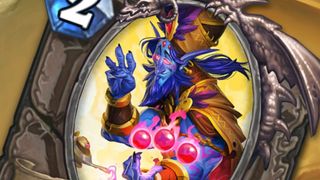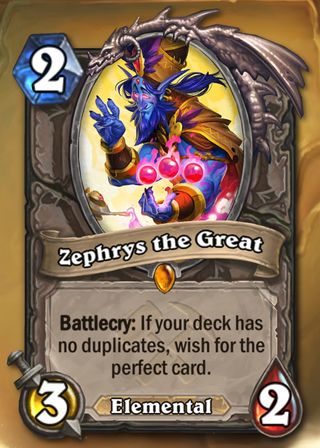This ludicrous new Hearthstone legendary uses AI to always give you the card you need
With Zephrys The Great, you leave your fate up to the machines.

Hearthstone has always stretched the margins of what's physically possible in a CCG. For years, Blizzard's ludicrously popular card game has generated random minions out of thin air, cast random spells at random targets, even warped entire classes and removed restrictions in the middle of the game—all which would require a ton of dice rolls and computations at a standard Friday Night Magic. But Zephrys the Great, a new legendary from Hearthstone's imminent expansion Saviors of Uldum, pushes the digital part of this digital card-battler to its most ambitious extremes. Here it is, in its original syntax.

"Battlecry: If your deck has no duplicates, wish for the perfect card."
As Peter Whalen and Brian Kibler demonstrated on today's card reveal stream, the AI behind Zephrys looks at the game-state on the board in front of you, and gives you a choice of three cards to add to your hand. Those choices are determined by what Zephrys considers the best possible addition to whatever win-condition your deck might be chasing.
So, in Kibler's experience, he dropped it on turn two and was given the choice of Brightwing, Animal Companion, and Wild Growth. Brightwing, Kibler's choice, is a value-oriented card compared to Animal Companion, which is an instant tempo swing. Kibler was playing a slow Control Mage deck, so it was a match made in heaven.
Obviously those choices would change if Kibler was in the late game and three damage off from lethal, or staring down a particularly scary board with no clears left in his hand. When he played it later in the stream on turn nine against a full enemy board, Zephrys offered Flamestrike, Ancient of War, and Brawl—two powerful board clears and a big Taunt minion.
It's one of the most esoteric concepts ever implemented into Hearthstone, but thankfully, Whalen cleared up some of the nuts-and-bolts during the stream.
"The idea was, 'What if the AI picked the best [cards] as some reasonable choices for you,'" says Whalen. "It looks at all the Basic and Classic cards, rates them all into categories, and gives you the best cards from the best categories. It tries to give you meaningful choices, and generally that means AOE, single-target removal, and a proactive play, so you can pick which one you need. Sometimes, if the board is bad enough, it'll give you three AOEs."
The biggest gaming news, reviews and hardware deals
Keep up to date with the most important stories and the best deals, as picked by the PC Gamer team.
This all makes sense, but we still have some questions. What happens if I'm up against a Murloc deck? Will Zephrys be smart enough to give me Hungry Crab? What about if my opponent plays Jaraxxus? Will it recognize that, and offer Sacrificial Pact? Will Zephrys always understand the specific type of card I'm after? Or will it be capable of whiffing? These sort of answers won't be answered until some of the best players in the game get their hands on the set, but if it's viable, expect a lot of goofy Hearthstone highlights in the future.
My favorite card that we've ever made. The amount of effort that went into bringing you this one individual card absolutely dwarfs all other cards.My favorite thing is when you play him, and are like "
? That's weird, why would it... OH WAIT THAT'S LETHAL!" pic.twitter.com/7BuD6WPlTpJuly 31, 2019

Luke Winkie is a freelance journalist and contributor to many publications, including PC Gamer, The New York Times, Gawker, Slate, and Mel Magazine. In between bouts of writing about Hearthstone, World of Warcraft and Twitch culture here on PC Gamer, Luke also publishes the newsletter On Posting. As a self-described "chronic poster," Luke has "spent hours deep-scrolling through surreptitious Likes tabs to uncover the root of intra-publication beef and broken down quote-tweet animosity like it’s Super Bowl tape." When he graduated from journalism school, he had no idea how bad it was going to get.
Most Popular


